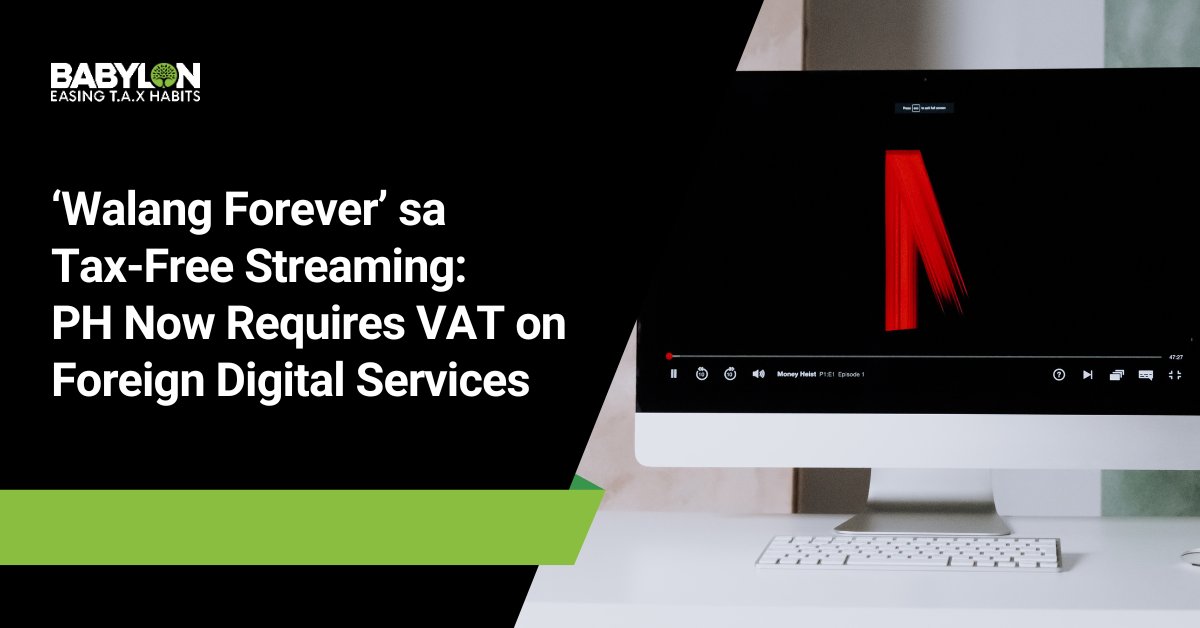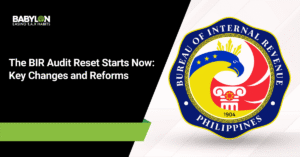Foreign streaming platforms, e-learning providers, and digital app developers serving Philippine customers must now prepare to enter the country’s tax net.
Beginning June 1, 2025, the Bureau of Internal Revenue (BIR) will require non-resident digital service providers (NRDSPs) to register and comply with the Philippines’ 12% Value-Added Tax (VAT) regime, in line with Republic Act No. 12023 and its implementing guidelines under Revenue Regulations (RR) Nos. 3-2025 and 14-2025, and Revenue Memorandum Circular No. 47-2025.
This sweeping tax reform aims to level the playing field between foreign digital platforms and local providers—and yes, it affects tech titans like Netflix, Meta, Spotify, and Google, but also applies to any foreign entity offering digital services consumed in the Philippines, regardless of size or scope.
Who Must Register?
Under the new regulations, foreign companies with no physical presence in the Philippines must register for VAT if they meet the following criteria:
- They deliver digital services over the internet or electronic networks;
- They generate gross receipts exceeding ₱3 million annually from sources within the Philippines.
Digital services include—but are not limited to—video and music streaming, mobile apps, e-books, online learning platforms, cloud storage, online marketplaces, and software-as-a-service (SaaS).
Mandatory Registration: Key Platforms and Deadlines
NRDSPs must complete their registration by June 1, 2025 through either of two online systems:
- VAT on Digital Services (VDS) Portal – A simplified BIR platform specifically for non-residents;
- Online Registration and Update System (ORUS) – The BIR’s existing e-registration system.
Registration is mandatory for any foreign provider meeting the ₱3 million threshold from Philippine-based customers, whether individual consumers or businesses.
VAT Remittance: Who Pays and How?
Under the new digital tax regime, the responsibility for remitting the 12% Value-Added Tax (VAT) hinges on the nature of the transaction—whether the service is rendered to a business or an individual consumer.
Business-to-Business (B2B) Transactions
When the digital service is provided to a Philippine VAT-registered business, the onus of VAT payment does not fall on the foreign digital provider. Instead, it is the local buyer who is required to withhold and remit the VAT to the Bureau of Internal Revenue (BIR) through the reverse charge mechanism.
This system ensures that:
- The Philippine buyer computes the 12% VAT on the value of the digital service purchased and remits it directly to the BIR.
- The non-resident digital service provider (NRDSP) is not required to register or charge VAT in B2B cases.
- The NRDSP cannot claim input VAT, as clarified under Revenue Regulations No. 3-2025. However, this does not translate to financial loss on their part, since they neither collect nor absorb the VAT cost.
- The Philippine business buyer is allowed to recognize the withheld VAT as input tax, provided the transaction is properly documented and the buyer is VAT-registered.
This mechanism avoids double taxation while ensuring government revenue is still captured through domestic remittance.
Business-to-Consumer (B2C) Transactions
When the service is rendered directly to individual consumers in the Philippines, the landscape changes. In these transactions, the foreign provider becomes the VAT remitter.
They are required to:
- Register with the BIR via the VAT on Digital Services (VDS) Portal
- Charge the 12% VAT on top of their service fees
- Collect the VAT from Filipino consumers, and
- Remit the collected VAT to the BIR through simplified monthly returns
As a result, end-users may see a modest increase in their digital subscriptions. For example, a standard ₱549 monthly subscription could climb to around ₱615 with VAT factored in.
Invoicing Requirements and Compliance
Although NRDSPs are not mandated to issue BIR-accredited invoices, they must still provide a transaction document—typically a receipt or invoice—that includes the following key elements:
- Date of the transaction
- Transaction Reference Number
- Name of the customer (and Taxpayer Identification Number or TIN for B2B clients)
- Brief description of the transaction
- Total amount with the indication that such amount includes the VAT
Furthermore, all transaction documents must be written in English or include an English translation. For NRDSPs handling mixed B2B and B2C transactions, the BIR requires clear segregation of taxable sales from non-taxable ones, and it must be evident which party is responsible for the VAT liability.
For B2B transactions where the Philippine business consumer is responsible for VAT remittance under the reverse charge mechanism, the NRDSP may include a footnote or annotation indicating that the Philippine buyer is responsible for remitting the VAT directly to the BIR.
Documentary Requirements: What Non-Resident DSPs Must Prepare
For successful registration, foreign providers must submit the following via the portal:
- Business Name & Trade Name: The legal and trade names of the NRDSP.
- Authorized Representative Details: If applicable, the name and Taxpayer Identification Number (TIN) of the local representative.
- Registered Foreign Address: The principal office address of the NRDSP abroad.
- Contact Information: Phone number and email address.
Required Additional Documents
- Apostilled Documents: Official documents (e.g., Articles of Incorporation, Certificate of Tax Residency) confirming the NRDSP’s legal status.
- Authorization: An Apostilled Board Resolution/Secretary’s Certificate for the representative, plus government-issued IDs of the signatories.
If ORUS is down, NRDSPs with a local representative can register manually at BIR Revenue District Office No. 39 – South Quezon City.
What Happens After Registration?
Once registered, the NRDSP will be issued a Taxpayer Identification Number (TIN) and a Certificate of VAT Registration. From there, the following obligations apply:
- File quarterly VAT returns and pay VAT on taxable digital services, particularly for business-to-consumer (B2C) transactions;
- Issue compliant invoices or transaction summaries.
The BIR has clarified that registered foreign providers are not required to issue BIR-printed invoices, but must maintain digital documentation for audit and reporting purposes.
The ₱3 Million Question: What If the Threshold Isn’t Met?
There remains uncertainty about the status of non-resident providers below the ₱3 million threshold. While they may not be subject to VAT, stakeholders have raised questions on whether they might instead fall under percentage tax under Section 116 of the Tax Code—a matter the BIR has yet to fully clarify.
Notably, even below the threshold, a provider may opt to voluntarily register for VAT—particularly if it wishes to demonstrate tax compliance or pass VAT onto customers.
Enforcement and Penalties
Non-compliance is not without consequence. NRDSPs that fail to register and remit VAT may face:
- Blocking orders via payment intermediaries or app stores;
- Fines and penalties under existing tax law;
- Potential inclusion in the BIR’s blacklist, which may restrict access to the Philippine market.
The BIR has also hinted at international cooperation and cross-border tax data exchanges to monitor compliance, particularly among large tech platforms.
The move to tax foreign digital services is not unique to the Philippines—it follows a growing global trend to level the playing field between local and international providers. However, the Philippine rollout comes with its own nuances and compliance challenges.
For digital firms, the key is early preparation: ensure that internal finance teams or tax agents understand the new requirements, compile all apostilled documents, and be ready to register well before the June 1 deadline. As the digital economy continues to expand, tax compliance is no longer just a local concern—it’s a global responsibility.
DISCLAIMER: This article is developed by subject matter experts at Babylon2k. This is for general information only and does not constitute expert advice. It is based on current regulations and may not account for all related topics. Any tax or compliance guidance provided cannot be used to avoid penalties or promote specific actions. Laws and interpretations may change over time, which could affect the accuracy of this report. We are not obligated to update this advisory if new regulations arise.
How We Can Help
Babylon2k’s B.E.T.H. can also help you when you need more information and clarification on taxes, businesses, finance, laws, and more. Learn More >
☎️ Get in Touch!
- Request a Free Consultation | Request Consult
- Message us on Viber/ Whatsapp Number @ +63-927-945-3382.
- Email us directly at [email protected]






